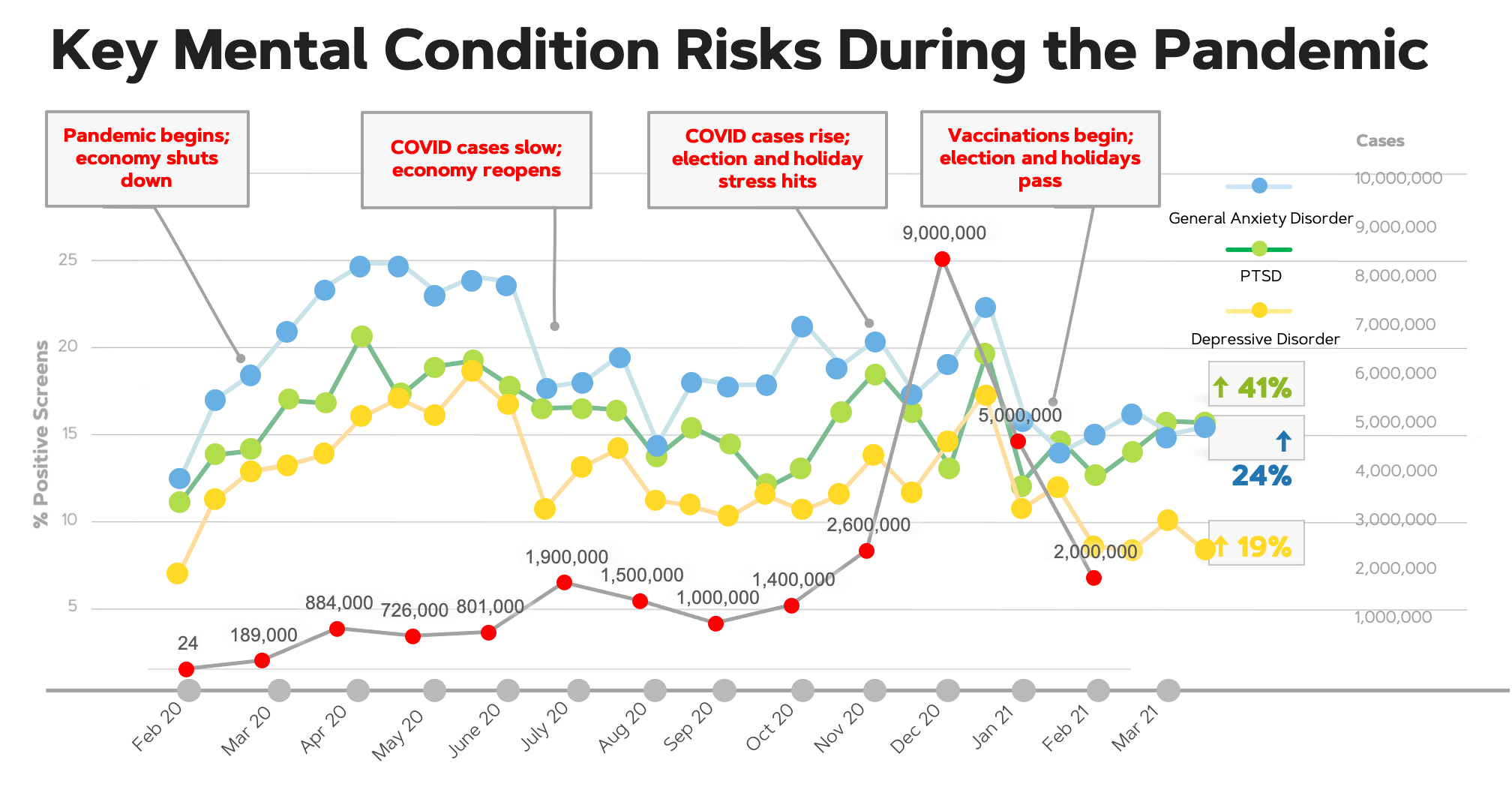By Matt Resteghini on Thu, May 27, 2021
During the first few months of 2021, Americans’ mental health rebounded somewhat from the extreme hit it took in 2020. But data captured recently by the Mental Health Index revealed that anxiety, stress, and depressed mood are creeping in the wrong direction again. All three increased recently in working Americans — particularly among women and workers in the 40-59 age group. These findings serve as a reminder that mental health is fluid, and that workers need ongoing support to deal with mental strain, even as the pandemic improves.
- Stress increased 13% from March to April
- Both anxiety and depressed mood are currently 15% above pre-pandemic levels
- Risk of Post-Traumatic Stress Disorder increased 29% between February and April
The Mental Health Index findings show that mental capacities including stress, anxiety, depressed mood, and nonconscious negativity all worsened in working women in April. In fact, stress increased 25%, anxiety went up 33%, depressed mood rose 23%, and nonconscious negativity trended upward by 4% among women. The fact that multiple capacities are deteriorating at once substantiates that women are struggling.
What Is Driving Worsening Mental Health in Women?
Total Brain conducted a deep dive into data and found that spikes in mental health issues during the past year directly related to increased cases of COVID-19 . There were also significant increases in mental strain at times when major political and social events occurred.

But, April was a relatively calm month in the U.S. — yet workers (mainly women) struggled more. Here’s a look at the events during April: a growing number of Americans continued to get vaccinated in April, COVID-19 cases decreased in many areas, and political tension was lower than at other points in the recent past.
So, what caused women’s mental health to decline? Part of the answer may lie in the fact that women are simply more susceptible to certain mental health issues than men. And small triggers can create sizable shifts among women.
Research shows that women have a greater risk of being diagnosed with anxiety and depression than men.
- Overall, women are nearly twice as likely as men to be diagnosed with an anxiety disorder in their lifetime.1
- Women are about two times as likely as men to be diagnosed with depression.2
Recognizing that women have a higher risk of suffering from anxiety and depression is important and necessary for ensuring that women receive the mental health resources and support they need. Also, understanding the differences between mental health risks in women and men makes it easier to learn from trends and patterns. For example, it is possible that women reverted ahead of men in April, and that men will follow. This is something to watch closely in the coming months.
Anxiety Is Plaguing Workers in the Middle Age Bracket
Another notable finding from the latest Mental Health Index is that workers across the 40-59 age group also showed increased signs of mental strain. Anxiety jumped up 40% in this middle age group of workers over the past two months.
-1.png?width=1200&name=Chart%20Images%20April%202021_Risk%20of%20depression%20-%20%20General%20(1)-1.png)
As a result, anxiety levels in workers between the ages of 40 and 59 are 47% higher now vs. before the pandemic. Beyond anxiety, another capacity that continues to be worse than it was before COVID is depressed mood. In workers aged 40-59, depressed mood is up 26% above the pre-pandemic level.
At the beginning of the pandemic, elevated anxiety may have been driven mainly by the rapid spread of COVID-19, consequent health worries and lifestyle disruptions. But, now that case numbers are falling, elevated anxiety may have a different cause. Based on a recent Total Brain survey, it appears some workers’ anxiety may stem from their feelings about returning to an office after working remotely during the pandemic.
In 2020, workers across the U.S. were sent home abruptly and forced to transition to a new way of working. The adjustment was not easy. Now, many workers are facing another major adjustment as workplaces begin to reopen. The prospect of having to go through another huge change is (understandably) triggering negative feelings in a large number of workers. Total Brain’s survey of 425 Americans who were temporarily working remotely found that two-thirds are “somewhat” or “extremely” anxious about returning to work in-person.
Businesses need to recognize that transitioning “back to normal” may be stressful for workers. The change of routine, lingering worries about COVID-19, an apprehension toward socializing with co-workers, and several other factors related to returning to work may induce anxiety.
Acknowledging the impact of bringing workers back into offices and providing additional support during the transition can help workers feel more at ease. Dive deeper by reading “Back to Work: How to Prepare for Five Mental Health Challenges Facing Returning Workers.”
For businesses, the key takeaway from recent Mental Health Index data is that despite the progress that is being made to end the pandemic, mental health challenges will continue to rise and fall. That is one certainty that will outlast the pandemic.
To keep tabs on other trends impacting workers, you are invited to check out our monthly webinars where industry thought leaders gather to review the latest Mental Health Index data and discuss the mental health of working Americans. You can register here.




comments